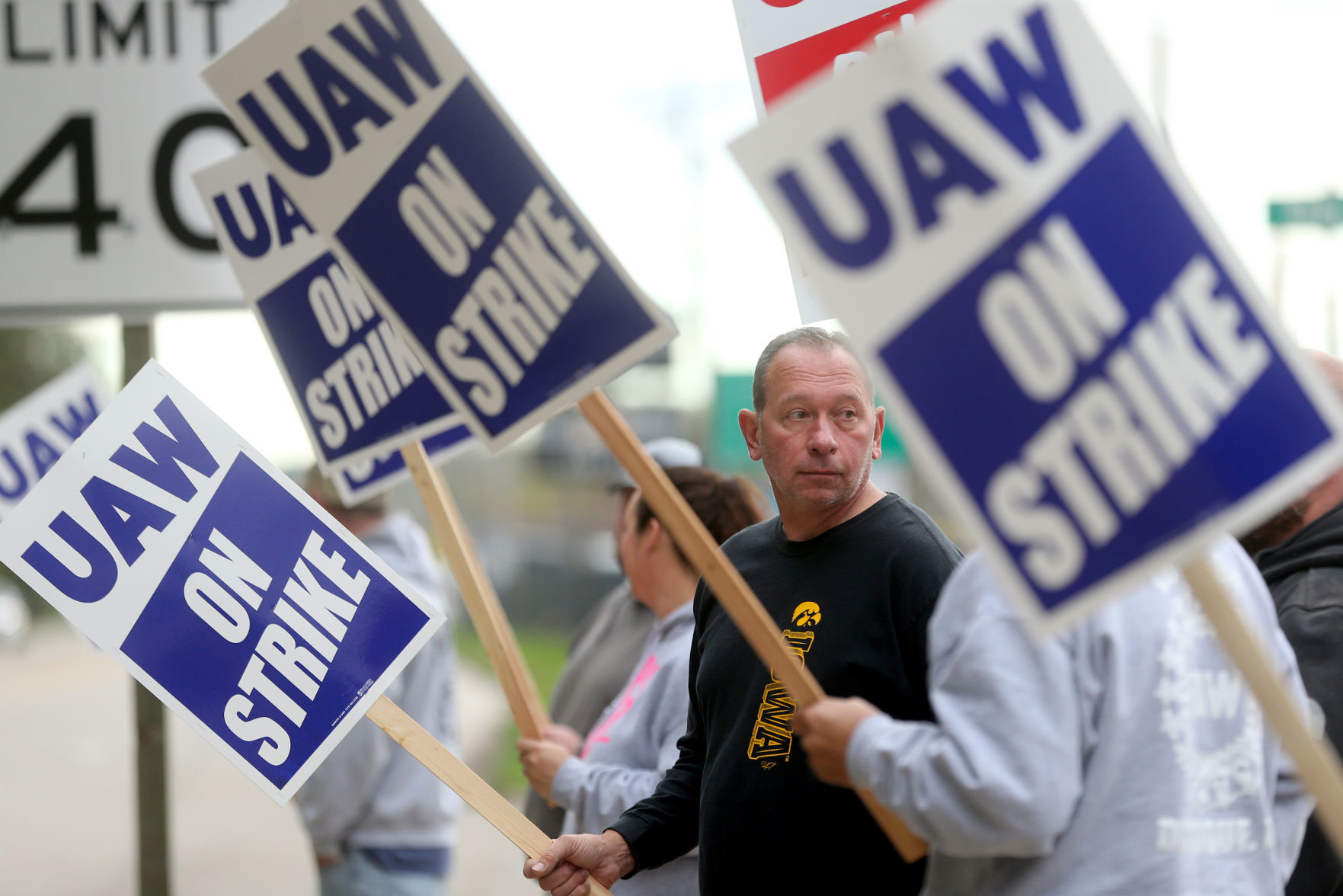As the duration of an ongoing strike inches closer to a full month, representatives from Deere & Co. and United Auto Workers remain in close contact.
However, the lack of a resolution has both sides thinking about long-term implications.
Deere officials on Tuesday acknowledged that they could turn to third-party labor or overseas production if the work stoppage persists. Meanwhile, the economic realities of the strike on union members are becoming increasingly apparent to labor leaders and local nonprofits.
John Stone, Deere & Co. president of worldwide construction and forestry and power systems, told the Telegraph Herald that talks continue with the International Union, United Automobile, Aerospace and Agricultural Implement Workers of America. However, he reiterated that Deere leaders stand behind the offer that UAW members voted down last week.
“We are still in conversations with the union, and we remain open to any proposals that they could make that would result in a ratified contract,” Stone said. “But we are pretty clear about the fact that we have (already) put some big numbers on the table.”
Under the agreement that was rejected, union workers would have seen wage increases of 10% in the first year and 5% each in the third and fifth years. Combined with cost-of-living increases, Deere officials have publicly estimated that the proposed six-year deal would have resulted in a 30% pay increase over the course of the agreement.
UAW International spokesman Brian Rothenberg acknowledged Tuesday that there still are discussions with the company but declined to comment on specific details of these conversations.
“Out of respect to our strikers and their families who are on the picket line, we are not going to bargain in the press,” he said. “Our members are on strike, and we really do appreciate the outpouring of community support for all our members and their families.”
Deere workers have been on strike since Oct. 14.
The contract between UAW and Deere covers more than 10,000 production and maintenance workers at about a dozen facilities, including John Deere Dubuque Works and other plants in Iowa and Illinois. John Deere Dubuque Works employs 2,800 workers, making it Dubuque County’s largest employer. About 1,500 of these workers are union members.
Deere plants, including Dubuque Works, have remained operational during the strike.
Stone said salaried workers, who generally would work in areas such as finance, human resources or engineering, have taken on new roles. This has involved everything from “picking and packing” parts to send out to customers, to continuing work on partially built machines.
“Everyone is trying their best to step up and fill the void to keep our customers up and running and not disappoint them,” Stone said. “If you lose a customer in this industry, it takes years to get them back.”
Stone said Deere’s primary goal is to “get its team back on the field,” emphasizing that ratifying a new contract with union members is the top objective.
Looking into the future, however, he acknowledged that other options are on the table.
“If we had to bring in third-party labor, yes, we would,” he said. “If we had to look at outside support to build, we can do that.”
He also noted that Deere could lean on plants outside the U.S. if needed.
“We do have factories in other parts of the world,” he said. “They are largely there to support their local markets, but they produce the same products we produce here in our North American factories.”
As the strike continues, UAW members are drawing support from area labor leaders.
Tom Townsend serves as president of Great River Area Labor Federation, which counts Dubuque Federation of Labor as one of its chapters. Townsend said members of other unions often have joined UAW members on the picket lines.
“We’re all standing together,” Townsend said. “We know they are trying to make working conditions better.”
He added that the nature of the UAW strike feels different than recent labor disputes.
“For a lot of years, businesses have had the upper hand, and (unions) would go into contract negotiations just hoping we didn’t lose anything,” Townsend said. “This strike shows there is a path forward and that negotiations can set you on a path to actually make improvements.”
Even so, Townsend said, the realities of the strike are hitting home for many UAW members, adding that those on strike “have been feeling the pinch” as the weeks go by without a resolution.
Area nonprofits have taken notice of the growing need for assistance in the community.
Josh Jasper, president and CEO of Resources Unite, said area nonprofits last week started to notice an increase in John Deere workers seeking food assistance. Many striking union members also are signing up for programs that provide Thanksgiving meals.
Jasper noted that area nonprofits are discussing how to brace for this increasing demand in the weeks ahead if the strike continues.
“We are trying to discuss how we can be proactive about helping that audience,” he said. “This is a group that may not be used to reaching out for help.”




